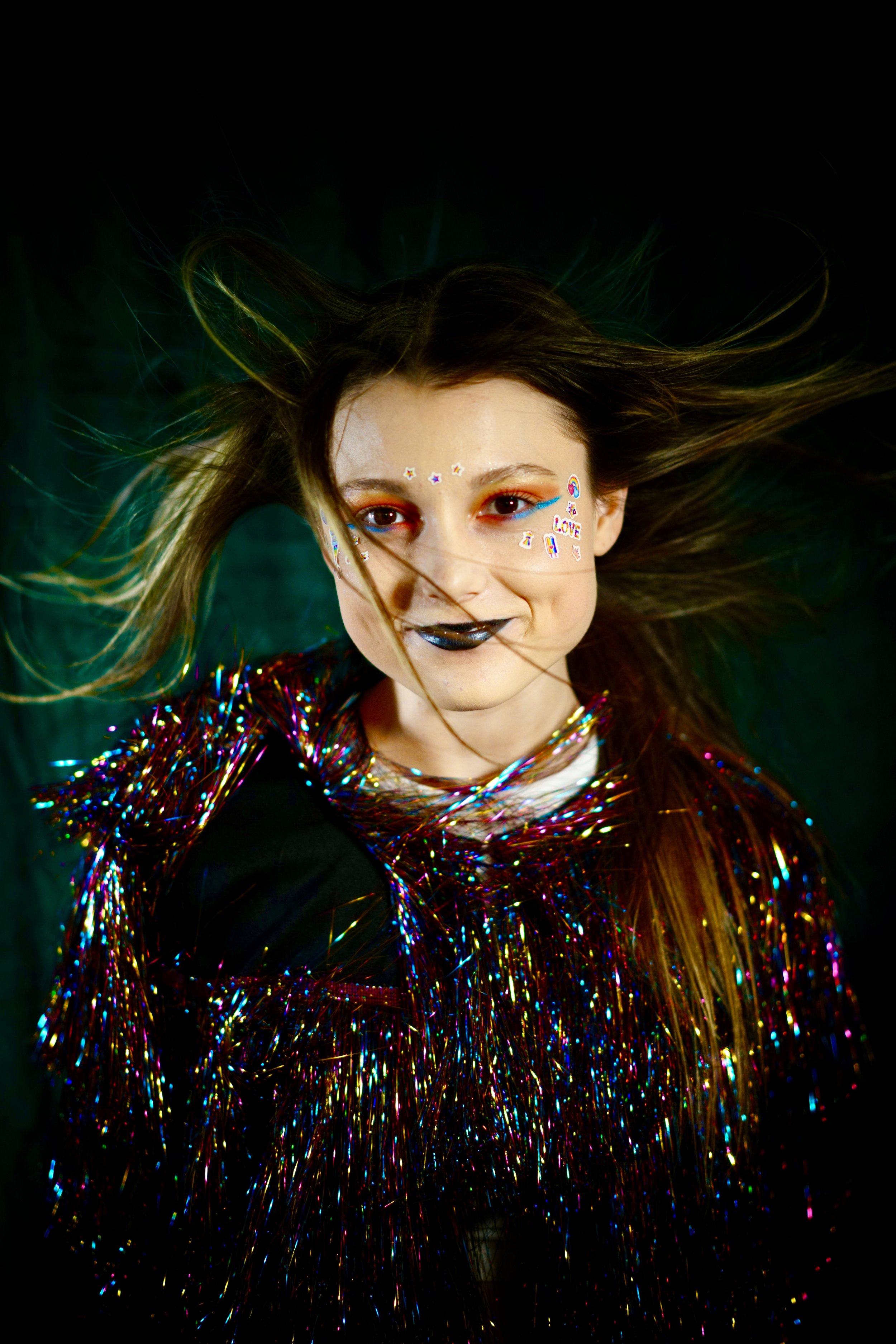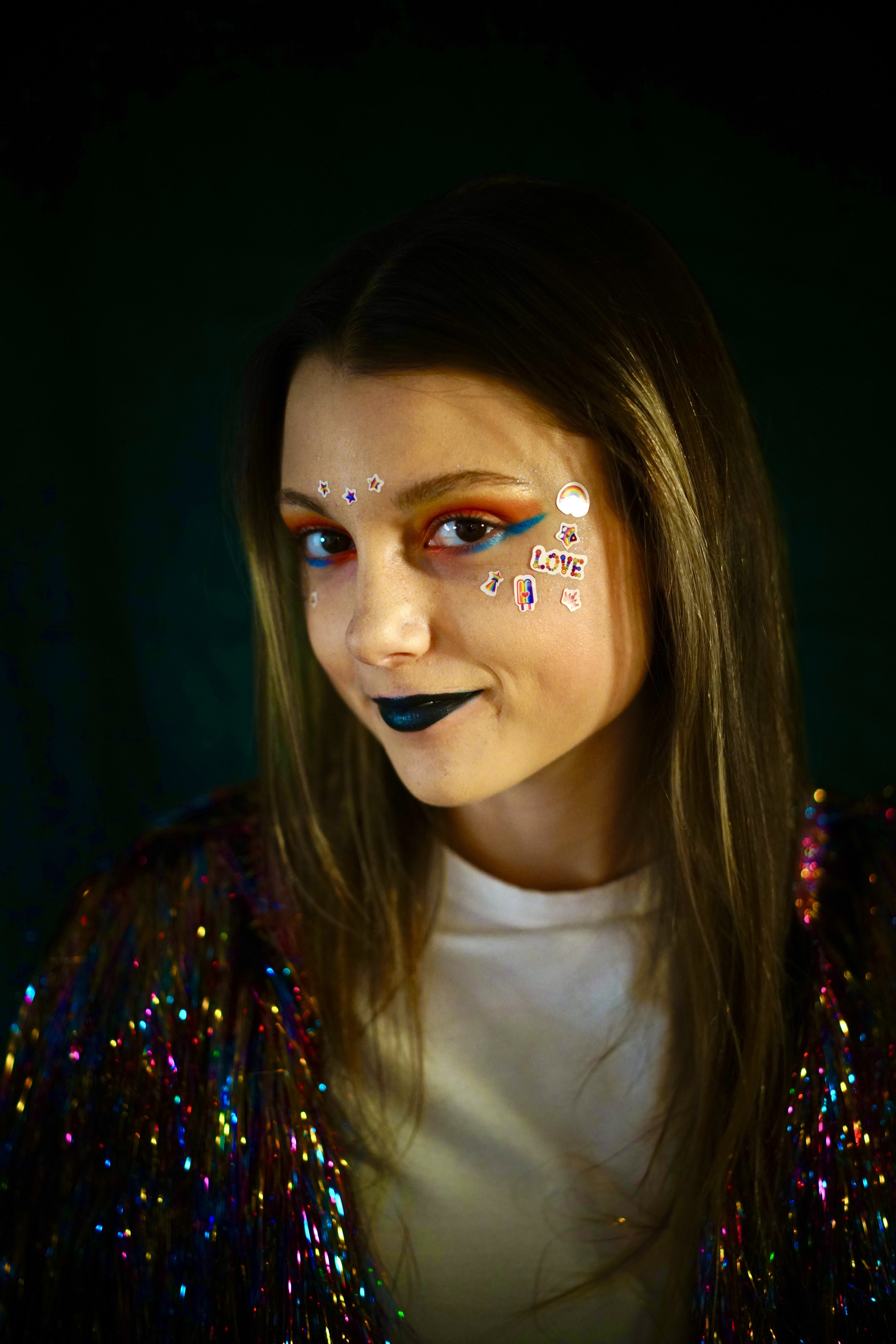Carnival of Perception
Vegas Welcomes ‘Witness’ Poetry
Editor, Jo Wallace
By Jade Darr | Photos by Tyler Boshard
In a landscape of incredibly competitive MFA Creative Writing programs, UNLV has managed to create one that manages to stand out for all the right reasons. There are connections to well-respected institutions like the Black Mountain Institute, a range of professors with straight-up intimidating resumes and special opportunities that would make any literary nerd salivate. And then, there’s also the MFA Candidates themselves — a collection of massively talented writers who cover a wide range of styles and subject matter.
Poet Jo Wallace is a shining example of this. Their excellent work and eye for the spectacular have landed them one of the program’s most coveted positions: Poetry Editor for The Witness, the Black Mountain Institute’s premier literary magazine.
Despite their personal identity as a writer, Jo sees a strong connection between their experience and that of writers around the world.
“I think it's very personal, and yet it's kind of the same for everyone,” says Jo of their own experience getting into poetry. “With writing or making art, you kind of start doing it before you realize what you're doing. Once I became conscious that I was making poems, I wanted to keep doing it.”
It’s a common feeling for poets, this poetic feeling that precedes identifying one’s work as poetry. Poetry is such a loaded term, one that has radically positive associations (transcendence, beauty, and elegance) as well as quite negative ones (pretense, elitism, and antiquity). In the end, it becomes a mode for us to reach for that which usually seems inexpressible. The nature of poetry both has amazing possibilities and frustrating limitations, but it’s the effort of reaching truth and impact that makes the practice worth it for poets
like Jo.
“The thing for me is that there are these strange and, I suspect, true, things that I want to express and talk about and point at really emphatically, but language is narrow, especially if you only write in one language like me. I only write in English — very limited. It has a limited capacity for getting those things right or true. I feel like poetry gets me nearby, and nearby is as close as I've gotten. This is the thing that I'm doing, I guess. And as I said, I think most artists or writers are coming from a very similar thing.”
The idea of getting near, but not quite capturing, our specific human experiences is both a concession to and a vision of poetry’s capabilities. On one hand, a poem will never be the same as the experiences, thoughts, and feelings that poets translate onto the page. Yet on the other hand, a poem will always be something truly new and unique. Like all great poets, Wallace turns to certain technical tactics in order to capture that ineffable effect that great poetry has on the reader.
“For me, I like to play with syntax a lot,” says Jo. “If I can come up with two images that kind of create the same emotional quality, I'll pick the weirder one. I feel that there's something more true about getting to an emotional quality via a stranger, defamiliarized image or feeling than by a standard or typical one that we're used to seeing. There's just something about that, and about surprise in poetry in general…not just being weird for weird's sake, obviously — strangeness is fun and cool — but strangeness to make meaning.”
Like many of us who live here, Jo is a transplant. They attended undergrad in Indiana before moving to Las Vegas for the MFA program. Still, they have a specific and immersive experience of the city, one that marries the disparate aspects of the city that make it such a fascinating place to live and write in.
“To me, there are a lot of elements. There's the city and the desert,” says Jo. “A lot of people talk about the desert, and the beautiful desert's beauty. But what makes Vegas Vegas to me is the uncanniness — which is so perfect for poetry and what I'm talking about. It's absolutely big and strange and so very much itself.”
Vegas’s strangeness is the product of several strong, drastically different characteristics - the opulent commercialism of the strip, the massive minimalism of the desert landscape, and all the day-to-day life and local art that often escapes the view of the tourist. But that’s a productive contrast for artists, and one that certainly feeds into how Jo views and creates
their own art.
“It reminds me of my favorite poems in that way because it defamiliarizes you from what you think the world is maybe supposed to look like,” says Jo. “It does it in such an unembarrassed, unabashed way. It knows that it's a carnival of perception. It's always messing with you, fucking with your head, and it does it on purpose, in a kind of fun, cool way. It does it in the sense that there are different versions of real things like, you know, New York City or the Eiffel Tower. Then there are terrifically obtrusive things like that giant bulb. I don't know what this giant glowing ball is, but I love it. No place else would have that except Las Vegas, like that uncanny, weirdness is so strange, but it's deliciously strange.”
For all the productive strangeness for Las Vegas and the poetry program that operates near its heart, Jo also acknowledges the limitations of such a selective space as an MFA program. It can be a bubble where writers are shut off from the community at large, and its ‘narrowness,’ as Jo describes it, can limit how much it prepares students for the world beyond the
classroom doors.
“I wonder sometimes if MFA programs are too narrow of spaces in general, and the literary community too. Even being here I wonder if I'm going to go out into the world and not be able to talk to people who don't read poems,” Jo says. “That's the main thing to me that I want to do or see more of - extending, not just poetry and literature, but arts in general to the community in the city that doesn't usually involve themselves with the arts. The art community in the city is very good at interacting with itself, but not necessarily as good at extending that reach.”
Vegas also poses problems due to its nature as a transient city. To those of us who live here, that transient quality fades with time, but the lights of the strip are a constant reminder of how much the tourism industry guides the direction of the city. Of course, there are visitors who taxi into the arts district and dip their toes into local culture, but it still feels like those areas live in the shadows of larger commercial establishments. That can certainly affect the arts scene from an emotional standpoint as well as from a practical one.
“In Vegas, people are coming here for very specific purposes - if people are local, you know, they're probably not gambling every night. They have lives and other things they're distracted with, and maybe they feel like they don't have time for the arts, or they have apprehensions about being involved,” says Jo. “So it can be hard to achieve that outreach. That's what I see as the next step beyond what Black Mountain and these other organizations have built.”
That’s not to say that Vegas isn’t making strides in establishing a more solid local culture. This year, there have been movements within the MFA program to create and provide sustainable support for local events.
“There's a backyard reading series that my cohort established this year that involves their neighborhoods, which is so cool,” says Jo. “Black Mountain started this Vegas in verse project which is trying to get poetry involved with other parts of the Vegas arts scene, which is still not necessarily involving outsiders of the art community, but I think it has more potential as it is involving more of those elements. It's starting, but I want to see more of that outreach — getting people who aren't directly involved.”
There’s also the division between the literary community within the program and the literary community beyond. There’s certainly a level of collaboration between the two, but especially to those less familiar with the scene, the gap is bigger than most people realize.
“We have certain programs that mesh the two really well like the student live reading series in the MFA program,” says Jo. “They'll often invite local writers to read. It'll be a mix of student work and local writers who aren't involved with the program. We'll have certain events and a lot of local writers will come to those readings and meet with the writers we've invited for
the program.”
However, there’s certainly a limitation to that interaction. The connections between art communities are often forged in similar aesthetic and end-goal values, and even when those match, it takes a lot of effort to bring groups together that might not normally interact. In Jo’s mind, that comes down to a mutual effort by multiple communities, and for the Las Vegas poetry scene, it’s a work in progress.
“I do think there's a little bit of separation to an extent which is what I was getting at early when I said that the MFA program can feel a little bit narrow at times,” says Jo. “I don't necessarily think that's all the fault of the program. You have to reach out to people outside of it to get there. But I do think that there are things that bring those communities together. I would love to see more capsule issues with some of the publications that maybe do more with local writers. I know that the program is involved with Las Vegas Writes, which is an anthology that publishes local writers. But I'd love to see that with more magazines and publications that we have.”
Thankfully, that division is far less present within the bounds of the program itself. While some MFA programs are dens of competitiveness and tension, the UNLV program contains tight-knit groups of students who support each other as artists and as people in general.
"I've found so many generous readers of my work within my cohort that make my poem-making so much better,” says Wallace. “I don't even feel like my professors are my only teachers. I feel like any person in my cohort could be my teacher at a given time. A lot of people go in feeling competitive or feeling bad about their work or about themselves. They don't want to share it because of imposter syndrome or whatever else we feel in this program. This program is very much about sharing the work, collaborating — making each
other better.”
Even more so, the program offers opportunities beyond merely sharing your work with engaged, critical readers. There are also opportunities that push writers out of their comfort zones into places that naturally transform one’s thoughts, work, and even language.
“I don't really speak French or Spanish,” says Jo. “I'm doing translation in both of those languages — very tediously — because of the requirements of the program. But it's such a valuable academic and educational tool. It's a great education in how to write better poems even when you don't really know the language because you're learning so much about linguistics. So I think that's a really valuable, practical part of the program as well.”
The idea of relocating as an artist is especially appealing to me; I’ve always found myself more attached to places than people, and my art changes drastically based on where I make it. At first, I used to think this was a universal artistic outlook. However, place affects artists in radically different ways: it’s not just that artists feel differently about different places, but that the nature of the place-work relationship is completely different. It’s similar to how someone can be extremely productive working while half-watching a reality television program, while the next person might need complete silence in a library to get anything done. For Jo, the place's impact on their work is directly tied to what they hope to accomplish through that work. Las Vegas might not insert bright lights and card games directly into their poems, but it does impact it in another way.
“It's kind of hard for me to articulate the relationship between my work and place because I think what I want to do when I'm writing a poem is make a poem it's own place, like you're entering it by reading it,” says Jo. “But obviously that can't be a physical space as much as it can be an emotional space. And I think those spaces, you know Las Vegas or Indiana, are where I'm drawing my emotions from when I'm writing the poem. I think that what tends to happen is that I write more narratively when I'm writing about places that I'm not in currently, like places from my past. When I'm writing about Las Vegas - not directly - I'm getting images or feelings from this place. It's always like a very immediate present tense which matches the fact that I'm here right now.”
When I first started reading Jo’s work, I noticed a couple common threads, but one stood out: family. Jo’s poetry weaves a complicated web of emotions between parents and their children, and it often zooms in on sibling relationships as well. It’s a near-universal experience - the complications of familial bonds that are so tight, yet rocked by hardships and incompatibilities - yet it’s one that Jo manages to make intensely immediate and personal. Part of the magic of Jo’s work is that they’re reaching back for something more than their own personal experience. There’s some sort of truth they’re reaching for that’s buried in the past.
“I think the reason I write about family so much is because I had a kind of hard childhood but I was such a happy child,” says Jo. “I think I also had this suspicion that childhood me, and also children in general, they know secrets that you forget once you become an adult. I forget what it's from, but there's this poem - or maybe it's a short story - where there's a young kid, eight or nine years old, and he goes up to his sibling - who is a baby in a crib - and he whispers into the crib and says, "Hey, do you remember God? I'm starting to forget." And I think about that
all the time.
I'm like yeah, that's kind of how I feel about my younger self. I think writing about family comes from writing toward childhood because being in the space in childhood, when I can access it, helps me get closer to certain things that I'm trying to express in poetry. Kind of like how I was talking about language at the beginning of the interview - there are these weird things that I know are true but I can't express them. I feel like the childhood me knew how to express them and I lost that.”
And ultimately, that’s what gives Jo’s work purpose being self-expression and love for the art form. Truly wonderful art creates connects between people. It’s more than relateability, where a person feels like they are also the speaker in the poem, or where an artist tries to recreate an experience that’s already been had. There’s a recognition that Jo reaches for that is both more casual and more intense than relateability. They’re reaching for a recognition, a shared truth, that we are living in this world together, and that we can share experiences while remaining completely ourselves.
“In terms of what I want other people to get out of that, I hopefully can succeed here and there at recovering a little bit of truth from childhood that maybe is nostalgic for someone. Maybe it's also true from someone else that puts them in that place as well. I don't necessarily feel like I want the reader to be like, "this is so relatable," but just to acknowledge it - like "I know that thing too," or "I've seen that thing too."
Jo is currently the editor for Witness, the UNLV literary magazine run through the Black Mountain Institute. If you want to support their work, you can find them at https://beavermag.org/jo-wallace/ or submit to the magazine.




